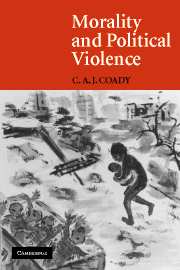Book contents
- Frontmatter
- Contents
- Preface
- Morality and Political Violence
- 1 Staring at Armageddon
- 2 The Idea of Violence
- 3 Violence and Justice
- 4 Aggression, Defence, and Just Cause
- 5 Justice with Prudence
- 6 The Right Way to Fight
- 7 The Problem of Collateral Damage
- 8 The Morality of Terrorism
- 9 The Immunities of Combatants
- 10 Morality and the Mercenary Warrior
- 11 Objecting Morally
- 12 Weapons of Mass Destruction
- 13 The Ideal of Peace
- 14 The Issue of Stringency
- Bibliography
- Index
- Frontmatter
- Contents
- Preface
- Morality and Political Violence
- 1 Staring at Armageddon
- 2 The Idea of Violence
- 3 Violence and Justice
- 4 Aggression, Defence, and Just Cause
- 5 Justice with Prudence
- 6 The Right Way to Fight
- 7 The Problem of Collateral Damage
- 8 The Morality of Terrorism
- 9 The Immunities of Combatants
- 10 Morality and the Mercenary Warrior
- 11 Objecting Morally
- 12 Weapons of Mass Destruction
- 13 The Ideal of Peace
- 14 The Issue of Stringency
- Bibliography
- Index
Summary
His power of choice he thrust on the police
As if it burnt his hands; he gave the banks
His power to work; then he bestowed with thanks
His power to think on Viscount Candlegrease. …
Strong in his impotence he can safely view
The battlefield of men, and shake his head
And say, “I know. But then what can I do?”
John Manifold, “The Deserter”Michael Walzer has argued that membership in the political community entails in certain circumstances an obligation to die for the state. In this, he follows Hobbes, and to a greater degree Rousseau, though like Hobbes, but for somewhat different reasons, he is uneasy with the obligation and, in the upshot, hedges it in various ways. Hobbes and Rousseau are not (unlike Walzer) conspicuous contributors to, or advocates for, just war theory, and this is, I believe, significant, since adherence to just war theory makes it difficult to maintain an unqualified commitment to the obligation. Indeed, some of the most significant challenges to at least the scope of the obligation have come from conscientious objectors who do not reject war altogether, and often rely upon a just war perspective to legitimate their refusal of service. In what follows, I shall examine some of the problems raised by the idea that governments should legally accommodate such challenges in a nonpunitive way. Let us begin with Hobbes's discussion of the alleged obligation to die for the state.
- Type
- Chapter
- Information
- Morality and Political Violence , pp. 228 - 248Publisher: Cambridge University PressPrint publication year: 2007



